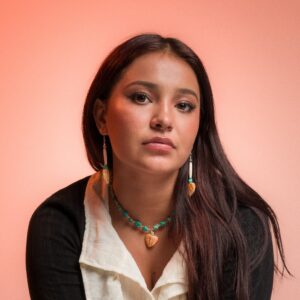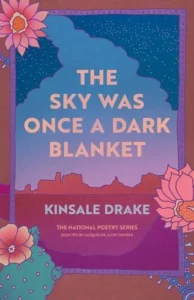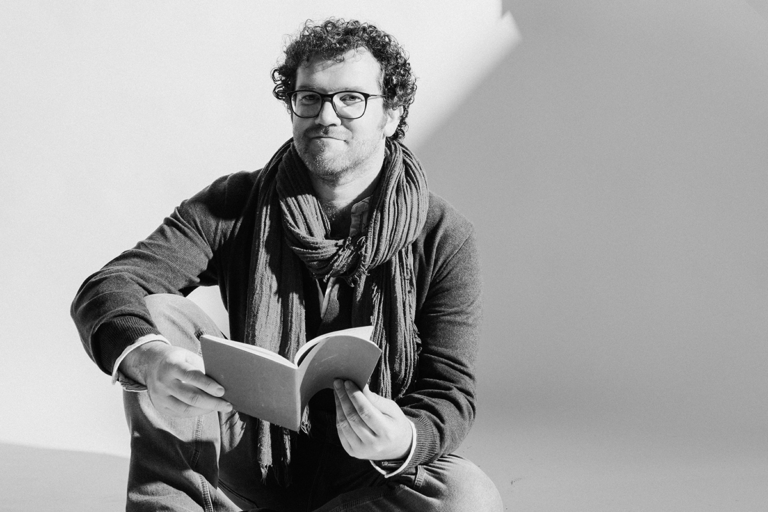Kinsale Drake
Put on that KTNN
In Kinsale Drake’s poem “Put on that KTNN,” she writes about driving to a hometown as a familiar station crackles to life on the car radio. From this corner of America, she creates her own country music — of Navajo voices alongside Johnny Cash and Loretta Lynn, of drumbeats and guitar licks, of things wrought by nature and things made by humans, all of them rooted in the desert sand.
We’re pleased to offer Kinsale Drake’s poem and invite you to read Pádraig’s weekly Poetry Unbound Substack, read the Poetry Unbound book, or listen back to all our episodes.
Guest

Kinsale Drake (Diné) is a poet, playwright, and performer based out of the Southwest U.S. She is a winner of the 2023 National Poetry Series Competition. Her poetry collection, The Sky Was Once a Dark Blanket, was published by The University of Georgia Press in 2024. Drake’s work has appeared in Poetry Magazine, Poets.org, Best New Poets, Black Warrior Review, Nylon, MTV, Teen Vogue, Time, and elsewhere. She recently graduated from Yale University, where she received the J. Edgar Meeker Prize, Academy of American Poets College Prize, Young Native Playwrights Award, and the 2022 Joy Harjo Poetry Prize. She is the founder of NDN Girls Book Club.
Transcript
Transcription by Alletta Cooper
Pádraig Ó Tuama: My name is Pádraig Ó Tuama, and last summer I was back in Belfast and it was during Belfast Traditional Music Week. It was a great festival, and one night I was in this small pub that was crowded and this great music was being played mostly by young people under 20, but there was a whole load of them too, as I heard them talk, who’d moved to Ireland and happened to like traditional music and so brought their own interests from afar. And they were expanding the music through their brilliance and through their own far-reaching. And walking home later on that night, I found myself thinking about what is it that music can do that evokes memory and evokes place and evokes belonging, but also it tracks change as well, because I’m not listening to those songs as if I was 5 again, I’m listening to them in my late forties. And Ireland has changed and I’ve changed, and the music, too, has changed to wrap all of that in its particular sonics.
[music: “Praise the Rain” by Gautam Srikishan]
“Put on that KTNN” by Kinsale Drake
“My mother was raised on Patsy Cline
and Hank Williams country
that bounced in on her father’s radio.
“Even today, I know I am nearing home
when the pop music crackles
into KTNN, licks
“of fluent Navajo flitting between
Loretta Lynn and Johnny Cash.
They are interludes, too,
“for drumbeats and throaty covers
of well-loved tunes put on
by some local boys’ gas station
“banjo and hot-rocket guitar,
a strong woman that sings
the seasons over a hand drum.
“Then it is back
to more Loretta Lynn.
All contradictions
“find a home in the body, the insect-skin
of the car sluicing the Arizona desert
as the cicadas pick up their grand
“instruments. How else to know
you enter a land of monuments, not
a wasteland, loved by radio waves
“and peach trees
and silly dogs that bridge
the distance between a chapter house
“and the nearest Sonics in a city.
The moon rocks darken into pine,
pine into slickrock,
“and the whole world remembers
what it once was—
grand ocean: sun, plankton, pearl,
“blood, ancestor, cloud. Radio rainbows
the most violent parts of the land
thrashed by thunderstorms and sea
“as the rattles pick up their backing track
and Hank Williams rolls in
all over again, easy and easy
“and blue.”
[music: “First Air, First Grief” by Gautam Srikishan]
This poem, “Put on that KTNN” by Kinsale Drake, it has a setting in Navajo land and in a place where a particular radio station reaches. In a certain sense, the FM and then, maybe even broader, the AM — which goes very, very far — defines a particular community who are interested in what it is that’s going to be communicated over this radio station, KTNN. Kinsale Drake is Diné and grew up in Los Angeles, as well as Navajo Mountain, which is on the Utah-Arizona border where her maternal grandmother lived. And so place is return home here. It is also sound. Place is also landscape. And place is memory, the memory of having been and grown up and knowing what is familiar in passing the particular sounds, the recognizability about what’s coming on the radio, the particular pastiche and tone and archive of song and language in Navajo and in English. These bring us all into a particular experience of place. But place is here also as a signpost: back, blood, ancestor, cloud, sun, plankton, pearl. The memory of all it is that the land knows it was, and all it is that you bring to the land yourself now, whether with contemporary music — Patsy Cline or Hank Williams or Loretta Lynn — or listening to “a strong woman that sings / the seasons over a hand drum” in multiple languages. Place is brought to mind, brought to memory, and brought to experience as well.
[music: “Family Tree” by Gautam Srikishan]
The title of the poem, “Put on that KTNN,” is a reference to a Navajo language radio station. K is the opening letter of American radio stations west of the Mississippi, and TNN stands for “The Navajo Nation.” I tuned into it while I was preparing for this and it’s got music, but also announcements, chapter news, as well as livestock and regional and international news, as well as then — as is mentioned in the poem — country, and Native American music.
Music holds so much of this together. So the opening line references Patsy Cline, and then there’s “Hank Williams country,” that bounces in on the father’s radio. And then “pop music crackles / into KTNN” and then “licks // of fluent Navajo.” There’s gorgeous, employment of verbs the whole way throughout. There’s “flitting” and then there’s “interludes” and “drumbeats” and “throaty covers / of well-loved tunes…/…some local boys’ gas station // banjo and hot-rocket guitar.”
Music comes in other ways too, the whole way throughout the poem, “cicadas pick up their grand // instruments.” It says that the “silly dogs bridge / the distance between a chapter house // and the nearest Sonics in a city.” There’s so much ways within, there’s so many ways within which you can look at that word “bridge.” There’s a line break after that. Of course, bridge is a musical term as well. And Sonics, a fast food place, as well as a way to talk about what it is that you hear. And “pine into slickrock, // and the whole world remembers / what it once was.”
In a way, it feels to me like Kinsale Drake is linking the music of the radio, and the music of family into some kind of demonstration of the music of creation, the music of, of remembrance, the music of the land that knows its own sound and knows its own history. “The most violent parts of the land / thrashed by thunderstorms, and sea // as the rattles pick up their backing track.” We’re caught into some moment of cataclysmic creation. And then right at the end of the poem, “and Hank Williams rolls in / all over again, easy and easy // and blue.”Music keeps on repeating from something enormous and strong and powerful to the way that it ends with repetition, “easy and easy // and–” This beautiful, choice to say two words and to say each of those two words twice “easy and easy // and.” And the final word, “blue.” Blue for what? Blue for the sky, blue for a mood, blue for a memory, blue for a flower.
[music: “Into the Earth” by Gautam Srikishan]
About halfway through the poem, Kinsale Drake makes this statement: “All contradictions // find a home in the body,” and then it continues to talk about “the insect-skin of the car / sluicing the Arizona desert.” And then the cicadas. I found myself wondering the first time I read this, What are the contradictions? In many ways, the contradictions become apparent as you read the whole poem. And these are contradictions about being from multiple places, being fluent in multiple languages, and being fluent in the musical language of Loretta Lynn and Patsy Cline, as well as then the seasons being sung by a “strong woman” on the radio over a hand drum.
It’s worthwhile paying attention to a word that’s very early on in the poem but is ultimately an enormous theme throughout the poem. “My mother was raised on Patsy Cline / and Hank Williams country / that bounced in on her father’s radio.” But to look at the word “country” — Kinsale Drake is Diné, and so to speak about country, ultimately in a poem, you’re hoping that every word can mean multiple things. “Hank Williams country” is the country of Diné, is the country of Navajo. So country music, of course is a genre, but the word itself is pointing beyond a genre of music and pointing to land, and who has lived on the land, and what has grown on the land, and the memory that the land has of itself. That’s a political and artistic and geographic and mystical, too, kind of memory that’s present in that word “country.”
What we find, I think, is that there’s a great calling together the whole way throughout this poem. It is a poem that imagines some kind of gathering. The word “and” occurs so many times in the last five, five and a half stanzas “and peach trees / and silly dogs” “and the nearest Sonics in a city.” “And the whole world remembers,” “thunderstorms and sea,” “easy and easy // and blue.” This is a generous poem about looking at a particular place and saying that this is a land of monuments, not a wasteland. And then looking at all of the layers of memory, of community, of family, of sound, and of the ancient place that is this planet we live on that has given us life. The and, and, and of abundance is everywhere and reaches something like some kind of orchestral crescendo as the poem completes itself.
[music: “Into the Earth” by Gautam Srikishan]
“Put on that KTNN” by Kinsale Drake
“My mother was raised on Patsy Cline
and Hank Williams country
that bounced in on her father’s radio.
“Even today, I know I am nearing home
when the pop music crackles
into KTNN, licks
“of fluent Navajo flitting between
Loretta Lynn and Johnny Cash.
They are interludes, too,
“for drumbeats and throaty covers
of well-loved tunes put on
by some local boys’ gas station
“banjo and hot-rocket guitar,
a strong woman that sings
the seasons over a hand drum.
“Then it is back
to more Loretta Lynn.
All contradictions
“find a home in the body, the insect-skin
of the car sluicing the Arizona desert
as the cicadas pick up their grand
“instruments. How else to know
you enter a land of monuments, not
a wasteland, loved by radio waves
“and peach trees
and silly dogs that bridge
the distance between a chapter house
“and the nearest Sonics in a city.
The moon rocks darken into pine,
pine into slickrock,
“and the whole world remembers
what it once was—
grand ocean: sun, plankton, pearl,
“blood, ancestor, cloud. Radio rainbows
the most violent parts of the land
thrashed by thunderstorms and sea
“as the rattles pick up their backing track
and Hank Williams rolls in
all over again, easy and easy
“and blue.”
[music: “Praise the Rain” by Gautam Srikishan]
Chris Heagle: “Put on that KTNN” comes from Kinsale Drake’s book The Sky Was Once a Dark Blanket. Thank you to the University of Georgia Press who gave us permission to use Kinsale’s poem. Read it on our website at onbeing.org.
[music: “Praise the Rain” by Gautam Srikishan]
Poetry Unbound is: Gautam Srikishan, Eddie Gonzalez, Lucas Johnson, Kayla Edwards, Tiffany Champion, Cameron Musar, and me, Chris Heagle.
Our music is composed and provided by Gautam Srikishan and Blue Dot Sessions.
This podcast is produced by On Being Studios, which is located on Dakota land. Open your world to poetry with us by subscribing to our Substack newsletter. For links and to find out more visit poetryunbound.org.
Books & Music
Recommended Reading
The On Being Project is an affiliate partner of Bookshop.org and Amazon.com. Any earnings we receive through these affiliate partnerships go into directly supporting The On Being Project.







